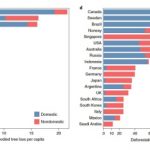Wildfires are back in the news. The link to rising global temperatures caused by climate change is clear. Mark Specht at the Union of Concerned Scientists summarises their study that, for the first time, puts a number on the level of responsibility attributable to fossil fuel companies. Rising temperatures create a “vapour pressure deficit,” a measure of the power of the air to dry out plants and trees. That leads to an increase in the area … [Read more...]
CO2 emissions from Land Use: country-level data for turning “emitters” into “sinks”
Until carbon capture technologies take off (if at all!), the world’s CO2 removals depend entirely on nature. Clemens Schwingshackl, Wolfgang Obermeier and Julia Pongratz at Ludwig Maximilian University of Munich, writing for Carbon Brief, review the latest data on “carbon fluxes” which measure whether the land is a net “source” of carbon or a “sink.” Flux measurements are categorised: deforestation, forestation, wood-harvest emissions, removals … [Read more...]
IPCC AR6 report reveals a bigger impact at lower temperatures than previously predicted: health, crops, species loss +more
Published in March, the IPPC’s AR6 Synthesis Report on Climate Change updates its predictions of the effects of temperature rises. It starkly concludes that those temperature rises will have a bigger impact at lower temperatures than previously predicted. Charlotte Edmond, writing for the World Economic Forum, picks out five charts from the report to illustrate the point: the range of likely temperature rises; global map of change in temperature, … [Read more...]
How new and better science is driving climate litigation
Delta Merner at the Union of Concerned Scientists makes her predictions for climate litigation in 2023. There will be much more, globally. The stand out observation is that new and better science is driving the evidence, impacting the litigants and the courts. That points at major changes to the litigation landscape. More granular geographical evidence allows local litigants to more accurately make a case for connecting emissions and pollutants … [Read more...]
How to protect marine mammals from the coming roll-out of Offshore Wind
The EU’s target for offshore wind is an installed capacity of at least 60 GW by 2030, and 300 GW by 2050. It will use the vast potential of the five EU sea basins, in particular the North Sea and the Baltic Sea. But growing awareness and concern over their impact on the marine ecosystem will require new methods of protecting sea life from the consequences. Isla Graham at the University of Aberdeen describes the work of her team on measuring … [Read more...]
Methane emissions reach unexpected new highs. Is climate change causing a runaway effect?
Simon Redfern at Nanyang Technological University, Singapore summarises his co-authored study that says methane emissions are four times more sensitive to climate change than that estimated in the latest IPCC report, which was only published in February 2022. The study follows the observation that, despite the pandemic stalling the world economy, methane emissions have reached new highs. Not because methane emissions have risen but because … [Read more...]
Wind and Solar expansion is a threat to biodiversity. But by how much?
Wind and solar take up space, so a massive expansion will have an effect on biodiversity. But how much? Sebastian Dunnett at Hammersmith and Fulham Council in London, writing for Carbon Brief, summarises his co-authored paper that takes the latest data on wind and solar and its multiple impacts (a few are good, surprisingly) on the environment. The conclusion is that the consequences of land overlap need not be as severe as feared, provided … [Read more...]
COP26: a strategy for tackling “imported deforestation”
Palm oil, beef, cocoa, coffee, soy, and other agricultural products are responsible for deforestation in the producing countries. Of the 10m hectares of tropical forest lost each year, two-thirds can be unambiguously attributed to agricultural expansion and international trade is responsible for about half of this. The EC is due in December to unveil a legislative proposal to address the issue. Alain Karsenty and Nicolas Picard, writing for IFRI, … [Read more...]
Land Use and Forestry: existing LULUCF rules allow EU’s carbon sink to decrease. Change them
The EU’s current Regulations for Land Use, Land Use Change and Forestry (LULUCF) allow the region’s carbon sink to decrease, explains Ulriikka Aarnio at CAN Europe. It’s due to exclusions and a lack of transparency and proper accounting for emissions. As a result, the EU’s carbon sink has already decreased significantly in the last few years, extracting only 265 Mt of CO2 in 2019. Different activities both emit and absorb carbon. 2019 saw 135 Mt … [Read more...]
A circular economy for waste solar PV materials: what needs to be done to get it started
Solar is already in the vanguard of the energy transition, and can similarly lead the world’s transition to a circular economy. Decommissioned PV modules could total 1 million tons of waste in the U.S. by 2030. Yet there are virtually no incentives or regulations to promote its recycling or reuse. In fact, says NREL, most current regulations in the U.S. define it as solid waste, making it difficult to introduce it to a recycling value chain. In … [Read more...]
What is your nation’s “deforestation footprint”? When imports cut down trees somewhere else
Behaviour change is now inextricably linked to the transition and must be part of the world’s emissions reduction strategy, and there are many different types of relevant behaviour and ways to measure the impacts. One is to look at deforestation, caused by chopping down trees to meet our consumer needs. To grasp whose behaviour has to change we need to appreciate to what extent deforestation in places like Brazil, Canada, Liberia, Vietnam etc., … [Read more...]
Five countries to become the field of behavioural experiments to encourage energy efficiency habits
The EU has ambitious targets for increasing energy efficiency and mitigating climate change, aiming that there are no net emissions of greenhouse gases by 2050. To achieve this and other targets, much effort and investment are focused on digital infrastructure (e.g., smart meters) that enables energy consumers to monitor and manage their energy usage more actively and efficiently. … [Read more...]
Methane emissions underestimated by 25-40%, says new study
The methane in our atmosphere comes from natural biogenic (plants, animals) and fossil sources. By telling the difference we can know how much we humans are responsible for. It matters because methane is a potent greenhouse gas, second only to CO2. Previous “bottom-up” estimates came from multiplying the number of sources (livestock, natural gas operations, landfills) by their likely emissions. Robert McSweeney at Carbon Brief describes a new … [Read more...]
The man who wanted to change the world – portrait of a climate visionary
Award-winning director Mariëtte Faber’s documentary “The man who wanted to change the world” has, in her words, come to the end of the line. After countless screenings and a decent clutch of awards, she has decided to make it available for all to see. Whilst climate visionary Peter Westerveld’s work, a key aspect of the film, was not directly related to energy, it was about reversing the momentum of dangerous climate patterns. The techniques … [Read more...]















